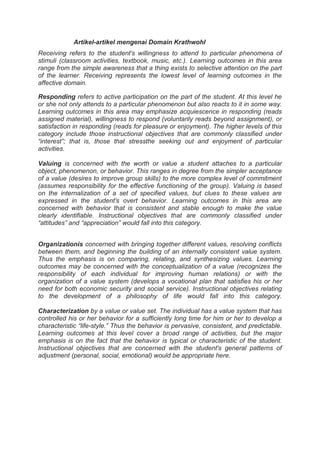
Lampiran
- 1. Artikel-artikel mengenai Domain Krathwohl Receiving refers to the student's willingness to attend to particular phenomena of stimuli (classroom activities, textbook, music, etc.). Learning outcomes in this area range from the simple awareness that a thing exists to selective attention on the part of the learner. Receiving represents the lowest level of learning outcomes in the affective domain. Responding refers to active participation on the part of the student. At this level he or she not only attends to a particular phenomenon but also reacts to it in some way. Learning outcomes in this area may emphasize acquiescence in responding (reads assigned material), willingness to respond (voluntarily reads beyond assignment), or satisfaction in responding (reads for pleasure or enjoyment). The higher levels of this category include those instructional objectives that are commonly classified under “interest”; that is, those that stressthe seeking out and enjoyment of particular activities. Valuing is concerned with the worth or value a student attaches to a particular object, phenomenon, or behavior. This ranges in degree from the simpler acceptance of a value (desires to improve group skills) to the more complex level of commitment (assumes responsibility for the effective functioning of the group). Valuing is based on the internalization of a set of specified values, but clues to these values are expressed in the student's overt behavior. Learning outcomes in this area are concerned with behavior that is consistent and stable enough to make the value clearly identifiable. Instructional objectives that are commonly classified under “attitudes” and “appreciation” would fall into this category. Organizationis concerned with bringing together different values, resolving conflicts between them, and beginning the building of an internally consistent value system. Thus the emphasis is on comparing, relating, and synthesizing values. Learning outcomes may be concerned with the conceptualization of a value (recognizes the responsibility of each individual for improving human relations) or with the organization of a value system (develops a vocational plan that satisfies his or her need for both economic security and social service). Instructional objectives relating to the development of a philosophy of life would fall into this category. Characterization by a value or value set. The individual has a value system that has controlled his or her behavior for a sufficiently long time for him or her to develop a characteristic “life-style.” Thus the behavior is pervasive, consistent, and predictable. Learning outcomes at this level cover a broad range of activities, but the major emphasis is on the fact that the behavior is typical or characteristic of the student. Instructional objectives that are concerned with the student's general patterns of adjustment (personal, social, emotional) would be appropriate here.
